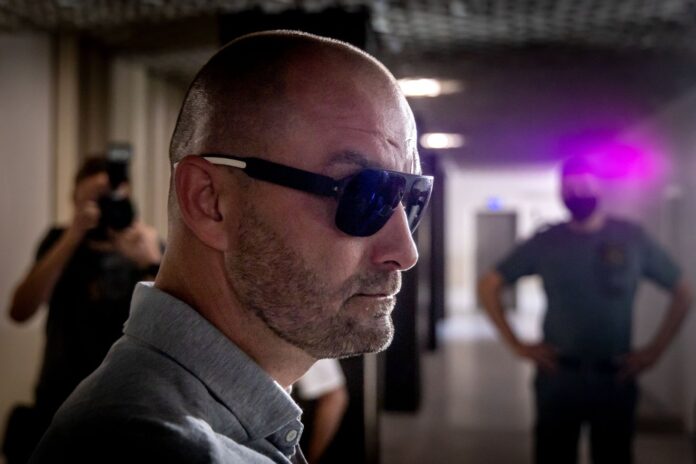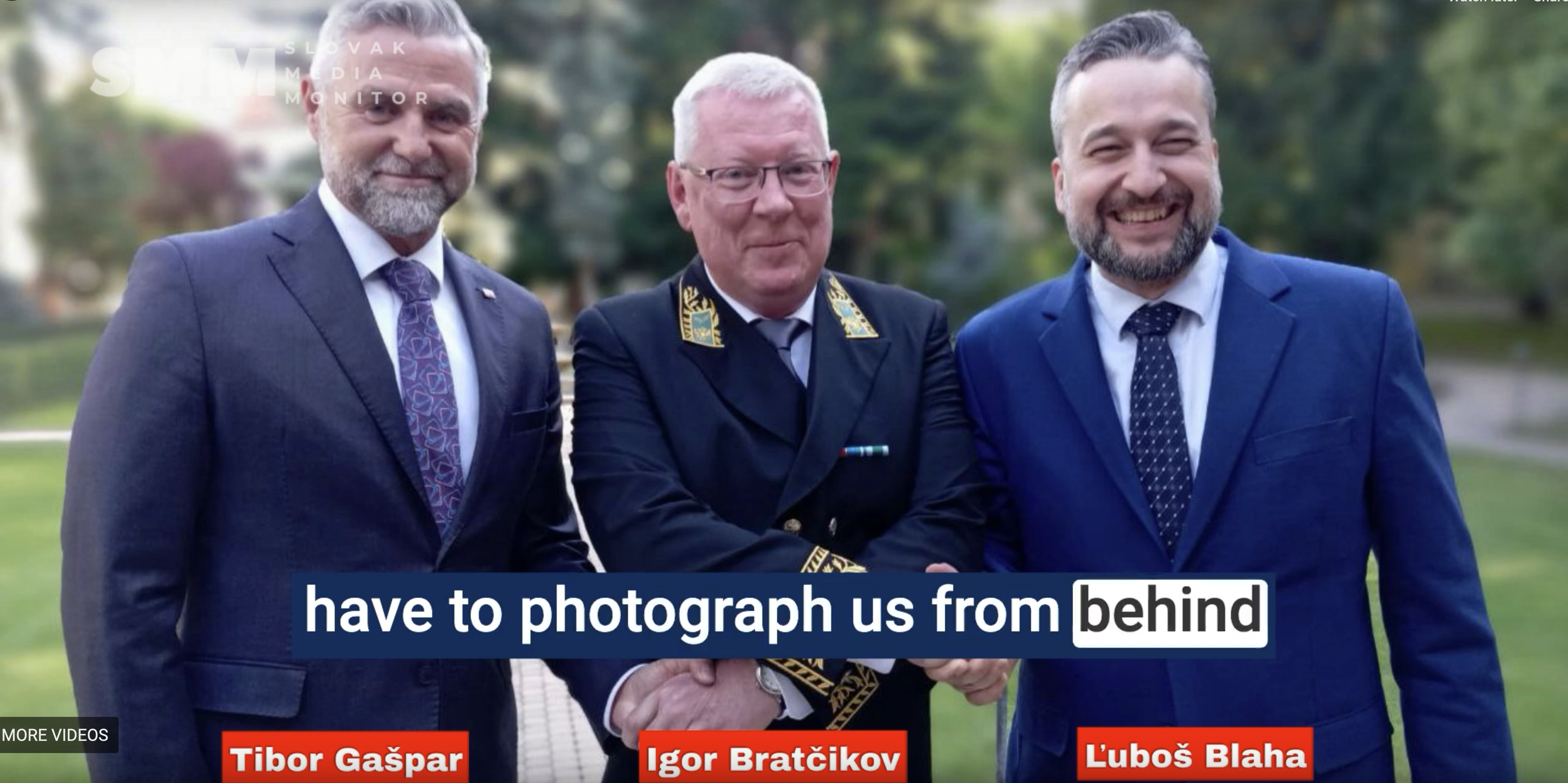Slovakia’s Prime Minister Robert Fico has openly welcomed Norbert Bödör—an oligarch under multiple criminal indictments—into the highest office of state, sparking renewed concerns over systemic corruption and the capture of democratic institutions. Bödör, a powerful businessman charged with laundering public funds and forming a criminal network inside the national police, was filmed conferring with the prime minister in the Government Office in Bratislava. Fico dismissed criticism and defended the meeting as “standard,” even as evidence from past investigations links Bödör to unlawful surveillance of journalists, political smear campaigns, and deep collusion with law enforcement during previous Smer-led governments. The encounter, which Fico himself publicised, has drawn outrage from civil society and opposition figures who warn it confirms what many have long suspected: that the Slovak state apparatus continues to serve private interests shielded by impunity.
Slovakia’s ruling elite has once again blurred the line between public office and private power with the open re-emergence of Norbert Bödör—a businessman and criminal defendant with deep-rooted connections to the ruling Smer party and law enforcement. Bödör’s presence in the country’s executive headquarters, the Office of the Government, was not exposed by investigative journalists nor leaked documents. Instead, it was proudly publicised by Prime Minister Robert Fico himself. In a video released on social media, the prime minister revealed that he had hosted Bödör for a working discussion. The topic? “Security at party events.”
This was not an isolated occurrence. In March 2024, Slovak television captured Bödör departing the government office by car—footage that provoked no disciplinary response, only mockery. Asked by a reporter about the nature of Bödör’s visit, the prime minister quipped that throwing a bucket of water at the journalist would be “too little.” For Fico, a man who routinely derides critics and invokes his own past criminal charges as political badges of honour, the outrage was something to be dismissed. “What’s it to you who I talk to?” he snapped.
But this is not just about poor optics. Norbert Bödör stands accused in two of Slovakia’s most serious corruption scandals in recent memory. The first is Operation Očistec (“Operation Purge”), a criminal case alleging that Bödör, in collusion with former Police President Tibor Gašpar—now a member of parliament—established and managed a criminal group within the Slovak police. According to prosecutors, this structure systematically abused the police force to protect the ruling Smer party and discredit its political opponents. Bödör has denied the charges.
He is also indicted in the Dobytkár (“Cattleman”) case, a sweeping corruption affair involving the Agricultural Payments Agency. Authorities accuse Bödör of laundering millions in bribes through a scheme that redirected state agricultural subsidies into private hands. The Slovak Supreme Court previously characterised the affair as a “mega-machine of corruption.” Again, Bödör maintains his innocence.
Despite this criminal backdrop, the prime minister has normalised Bödör’s visits to the seat of government. This overt legitimisation—first through minimisation, then through spectacle—signals a deliberate move to reinsert Bödör into the inner circle of power. The video, dressed in the casual aesthetic of a social media influencer’s “day in the life,” was carefully designed. Between scenes of the prime minister signing laws and supervising a building renovation, viewers were shown Bödör seated beside him in a formal setting, poring over documents. The message was unmistakable: Bödör is back, and he is welcome.
The Criminal Elite Reclaims the Government Halls
This embrace of a man accused of criminal conspiracy has unfolded in parallel with a wider erosion of institutional boundaries. The Office of the Government has increasingly become an extension of the Smer party’s operations. Senior party figures—including Tibor Gašpar and former Interior Minister Robert Kaliňák—frequent press events within its walls, despite their roles as supposed overseers of the executive. Even Marek Para, a lawyer with no official role in government but a personal adviser to Fico, regularly appears behind government podiums.
What makes this brazenness so significant is its historical continuity. Bödör’s influence over public institutions was not born overnight. During earlier Smer-led governments, he wielded behind-the-scenes power over the police, customs, and financial crime enforcement. His family’s security firm, Bonul, thrived on lucrative state contracts. More damningly, multiple witnesses have described how Bödör selected candidates for senior law enforcement positions and controlled their loyalty—sometimes through salary supplements.
Nowhere was this machinery more evident than in the campaign against former President Andrej Kiska. According to sworn testimony, Bödör attended meetings at the Office of the Government where the strategy to publicly discredit Kiska over alleged tax irregularities was devised. Those present included then Finance Minister Peter Kažimír—now Governor of the National Bank—and top tax officials. The ultimate goal, according to investigators, was to leak damaging material to the media anonymously. Testimony suggests Bödör orchestrated the leak, provided a curated list of media contacts, and personally ensured the release. “It was difficult and expensive to arrange,” he reportedly told one official.
From the Shadows to the Strategy Room: How Bödör Operated
Bödör’s ties to convicted mafia figure Marian Kočner add another layer to the narrative. Their communications, uncovered during the investigation into the 2018 murder of journalist Ján Kuciak, revealed a disturbing familiarity. Kočner described feeling as though “only the two of us are with the boss”—a reference to Fico. Bödör’s name appeared repeatedly in the Threema encrypted messaging platform logs, which also suggested his involvement in securing illegal police surveillance of journalists, including Kuciak himself.
Moreover, former officials have testified that Bödör commissioned surveillance not just of journalists, but also opposition politicians. Ex-head of the Financial Crime Unit Ľudovít Makó told investigators that Bödör ordered tailing of reporters from Denník N and .týždeň, and ex-politician Daniel Lipšic, now Slovakia’s former Special Prosecutor. Meetings to plan these operations allegedly took place in Bödör’s private cellar in Radošina, with participants including senior police officials and even the now-imprisoned ex-prosecutor Dušan Kováčik.
Public records and phone logs corroborate that Bödör called the Office of the Government directly and frequently during this period—often late at night. The calls, placed to Mária Trošková, a senior adviser to Prime Minister Fico and known associate of the Italian mafia figure Antonino Vadala, have never been fully explained. Bödör claimed not to know who he was calling. Fico, as is his habit, claimed no knowledge and offered no clarification.
The revolving door between Bödör and public institutions has not merely remained open—it has been widened. Just two days after Bödör’s latest visit to the Office of the Government, three top officials at the Financial Crime Unit were abruptly removed. This unit, critical for tax enforcement and corruption investigations, had previously fallen under Bödör’s influence. Though no official reason was given, multiple sources cited by the Slovak press suggested a direct link between Bödör’s visit and the shakeup. The government denied any external interference.
When Watchdogs Are Gagged, the Wolves Roam Free
While the government attempts to push legislation that would force NGOs to register all meetings with public officials under the guise of transparency, it refuses to answer basic questions about Bödör’s own meetings. The Office of the Government declined to say who hosted Bödör, what the agenda was, or how long the meeting lasted. No official records have been made available, despite requests from the media. In stark contrast, the government wants civil society organisations to report similar meetings in full.
And what of the reaction in parliament? It ranged from stonewalling to ridicule. Coalition MPs from Smer and their allies in the far-right Slovak National Party (SNS) dismissed journalists’ questions. Some claimed not to know who Bödör was. Others mocked reporters, walked away from microphones, or insisted that visits from criminal defendants are no cause for concern. Only a few, like former defence minister Jaroslav Naď or MP Ondrej Dostál from the opposition SaS, have called out the inconsistency and hypocrisy in the government’s approach.
It is not just a story of one oligarch. It is a portrait of a governing culture where democratic norms are bypassed with impunity, where criminal trials are treated as formalities, and where the same individuals accused of system-wide abuse are invited back into the rooms where state power is wielded. Norbert Bödör’s reappearance inside Slovakia’s centre of power is not a misstep. It is the strategy.
Source:
Veronika Prušová and Mária Benedikovičová | Denník N
Daniela Hajčáková | SME.sk
Martin Behul | Aktuality.sk








